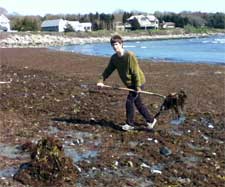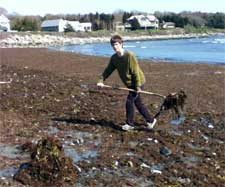 KINGSTON, R.I. – January 3, 2013 – University of Rhode Island junior Nate Winkler has a nose for soil. He started a landscaping business while in middle school that has been his primary source of income ever since, and he looks forward to joining the University’s soil judging team next year. But it is his soil research over the last six months that is getting him noticed.
KINGSTON, R.I. – January 3, 2013 – University of Rhode Island junior Nate Winkler has a nose for soil. He started a landscaping business while in middle school that has been his primary source of income ever since, and he looks forward to joining the University’s soil judging team next year. But it is his soil research over the last six months that is getting him noticed.
The Wakefield native, who worked in collaboration with graduate student Angela Possinger and Professor Jose Amador, said that seaweed was historically used as “a soil amendment” by farmers growing potatoes in southern New England. In an effort to scientifically validate its value as a fertilizer, Winkler harvested seaweed from a beach in Jamestown last May, dried it out to avoid introducing sea salt to the soil, spread it by hand in test plots on the URI agronomy fields, and tilled it into the soil before planting corn.
After taking soil core samples throughout the summer to assess the amount of phosphorous available to the plants, he found that the seaweed produced a significantly greater yield than corn planted without the seaweed. He also found that the plants preferred to use scarcer phosphorous found in solution rather than the more abundant phosphorous bound to the soil.
“Seaweed is available on the beach, it’s free, it’s a public nuisance, so if farmers are educated about its use, maybe it will decrease their dependence on conventional fertilizer if farmers use the seaweed as a natural organic fertilizer instead,” said Winkler, who is majoring in environmental science and management.
His research was conducted as part of the URI Coastal Fellows Program, a unique initiative designed to involve undergraduate students in addressing current environmental problems. Now in its 17th year, it is based at URI’s College of the Environment and Life Sciences. Students are paired with a mentor and research staff to help them gain skills relevant to their academic major and future occupations.
Winkler found the entire experience quite motivating.
“I learned that I’m really passionate about soil science and field work and research,” he said. “I had never worked in a lab before, and I was nervous that I wasn’t going to have that opportunity because I had no experience. But right off the bat I was doing fieldwork and doing lab work and really using what I learned in my biology and chemistry classes. It was a really valuable experience.”
The URI student has a backlog of soil samples from the project that he hopes to continue analyzing in the coming year to see what else he can learn about the benefits of using seaweed as a fertilizer.
As he looks to his future, Winkler said he hopes to enter a graduate program at URI to continue his studies of soil science with Professor Amador.
“I really like the hands-on aspect of the program,” he said. “I didn’t really even know what soil science was until I took my first class in it, and I’m still not exactly sure all of what it has to offer, but I’m enjoying it so far.
“I’d really like to end up working in a lab somewhere because I love doing research,” he added. “I also love doing soil mapping and doing fieldwork on land uses. I’m really passionate about the big picture of the issues it raises. But I’m not the type of person to pick a specific direction right away, so I’m going to take my time and hopefully it will all fall into place once I get to grad school.”
Photo submitted by Nate Winkler

